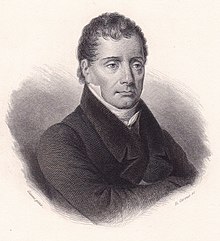Pierre-Paul Royer-Collard

Pierre-Paul Royer-Collard (born June 21, 1763 in Sompuis near Vitry-le-François , † September 2, 1845 in Châteauvieux ) was a French philosopher and politician . He was the older brother of the doctor Antoine-Athanase Royer-Collard .
Life
Royer-Collard's father was Antoine Royer, a landowner, his mother Angélique Perpétue Collard, who is portrayed as having a strong character and pious. From the age of twelve, Pierre-Paul attended the college in Chaumont , which was directed by his uncle, Father Paul Collard. He also followed his uncle to Saint-Omer , where Pierre-Paul studied mathematics .
When the French Revolution broke out, Royer-Collard was working at the Paris court. He represented the Île Saint-Louis in Paris in the Commune (later the National Assembly ), as its secretary he served from 1790 to 1792. After the coup on August 10, 1792 , he was replaced by Jean Lambert Tallien . Royer now sympathized with the Girondists . After the uprising of the Paris sans-culottes , he had to flee to Sompuis. Only the protection of Georges Danton and the courageous demeanor of his mother saved Royer-Collard from imprisonment.
In 1797 the Marne department sent him to the Council of Five Hundred , where he worked in particular with Camille Jordan . In a famous speech he defended religious freedom , but after the coup d'état of the 18th Fructidor V (September 4, 1797) he had to withdraw from political life again. At this time he began to elaborate his legitimist positions and communicated with the Count of Provence (later King Louis XVIII. ). Royer-Collard was in charge of a small committee that sought a restoration independent of Count d'Artois (later King Charles X ).
With the establishment of the rule of Napoleon Bonaparte ( French consulate ) in 1799, the committee disbanded and Royer-Collard initially devoted himself exclusively to philosophical issues. From his study of the work of René Descartes and his students and his admiration for the Messieurs de Port-Royal , Royer-Collard developed a counter-position to Étienne Bonnot de Condillac . He created a concept for the establishment of a moral and political education system to meet the needs of France.
From 1811 to 1814 he taught philosophy at the Sorbonne . His friendship with François Guizot also dates from this time .
With the restoration of the Bourbon monarchy ( restoration ), Royer-Collard took over the function of press supervisor. From 1815 he represented the Marne department in the Chamber of Deputies . He was head of the Public Education Commission from 1815 to 1820, but was forced to resign when he tried to pass degrees to teaching brothers in Christian schools at the University of Paris without taking a university exam .
Despite his legitimist attitude, Royerd-Collard defended the achievements of the French Revolution several times and protested against emergency laws in 1815, 1820 and under the July monarchy .
Royer-Collard was seen as a driving force in the "party" of doctrinaires ( Doctrinaires ), to which Guizot belonged. They met at Louis de Beaupoil de Saint-Aulaire and the daughter of Madame de Staël and wife of Achille-Léon-Victor de Broglie , Albertine de Broglie. Other leading figures besides Royer-Collard, Guizot and Jordan were Hercule de Serre and Charles de Rémusat . In 1820 Royer-Collard was excluded from the district by de Serre.
In 1827 Royer-Collard won in seven electoral districts, but again went to parliament (Chamber of Deputies of the Départements) for his home department, of which he was president from 1828 to 1830. Here he fought against the reaction that preceded the July Revolution of 1830 . On 16 March 1830 he headed the delegation that the king X. Karl the declaration of the 221 delivered. Royer-Collard remained a member of parliament until 1839, but no longer made any significant contribution.
Royer-Collard held a professorship at the École normal supérieure , was dean , head of the printing works and library there, and president of the university's royal council. On April 19, 1827, he was elected to succeed Pierre-Simon Laplace in the Académie française and accepted on November 13, 1827 by Pierre Daru . With this election, the academy took a first step towards liberal ideas . Royer-Collard voted to accept Guizot and Victor Hugo , although he treated them badly when he introduced him: he pretended to know neither him nor what has been written about him in the previous 30 years.
From 1799 he was married to Mlle. Forges de Châteauvieux, two daughters reached adulthood.
No authoritative writings have survived from Royer-Collard. Théodore Simon Jouffroy only included a few fragments in his translation of the works of Thomas Reid . There are biographies of Prosper de Barante , MA Philippe, L. Vingtain and E. Spuller.
literature
- Royer-Collard, Pierre Paul , in: Encyclopædia Britannica , 11th edition, 1911
- Rudolf Eisler: Royer-Collard, Pierre Paul , in: Philosophen-Lexikon . Berlin 1912, p. 615 f.
Web links
- Short biography and list of works of the Académie française (French)
- Literature by and about Pierre-Paul Royer-Collard in the SUDOC catalog (Association of French University Libraries)
- Wikisource: Royer Collard's admission to the French Academy , a newspaper article from the 1828 journal “The Abroad”.
Remarks
Provisional links to the French-language Wikipedia:
- ↑ fr: Camille Jordan (homme politique)
- ↑ fr: Doctrinaires (politique)
- ↑ fr: Louis de Sainte-Aulaire
- ↑ fr: Hercule de Serre
- ↑ fr: address of 221
- ↑ fr: Prosper de Barante
| personal data | |
|---|---|
| SURNAME | Royer-Collard, Pierre-Paul |
| BRIEF DESCRIPTION | French philosopher and politician |
| DATE OF BIRTH | June 21, 1763 |
| PLACE OF BIRTH | Sompuis at Vitry-le-François |
| DATE OF DEATH | September 2, 1845 |
| Place of death | Châteauvieux (Loir-et-Cher) |
